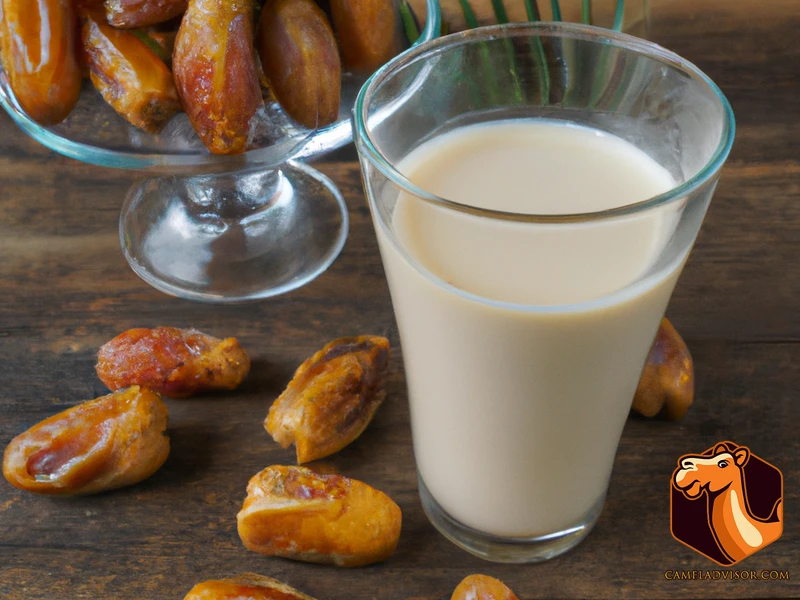Have you ever considered drinking camel milk to improve your digestive health? Despite being a less conventional option, camel milk is gaining recognition for its ability to aid in digestion and relieve stomach issues. Many people are surprised to learn that camel milk contains nutrients that support digestion, probiotics that balance gut flora, and is low-lactose and easily digestible. In this article, we will delve into the science behind camel milk’s digestive properties and explore how it can help with specific digestive issues such as IBS, constipation, and diarrhea. We will also discuss how to consume camel milk for the best digestive results and touch on some risks and precautions to keep in mind. So, let’s explore how the humble camel may be able to help us achieve better digestive health!
Contents
- The Science Behind Camel Milk’s Digestive Properties
- How Camel Milk Can Help with Specific Digestive Issues
- How to Consume Camel Milk for Best Digestive Results
- Risks and Precautions
- Conclusion
-
Frequently Asked Questions
- What nutrients are present in camel milk that support digestion?
- How do probiotics in camel milk benefit digestion?
- Is camel milk low in lactose?
- How is camel milk easily digestible?
- Can camel milk really help with IBS?
- How does camel milk improve constipation?
- Does camel milk help with diarrhea?
- Can I consume camel milk if I am lactose intolerant?
- What is the recommended daily intake of camel milk?
- Are there any side effects I should be aware of when consuming camel milk?
- References
The Science Behind Camel Milk’s Digestive Properties

Camel milk has been valued for its health benefits for centuries. It is known to improve immune function, manage conditions such as diabetes and aid in skincare. However, one lesser-known benefit of camel milk is its ability to aid in digestion and relieve stomach issues. The science behind camel milk’s digestive properties is intriguing and involves several factors, including its nutrient content and probiotic composition. In this section, we will explore the science behind camel milk’s digestive properties in greater detail.
Rich in Nutrients That Support Digestion
Camel milk has been found to be rich in several key nutrients that are essential for a healthy digestive system. These nutrients can help with the breakdown of food and the absorption of nutrients, while also supporting the growth of healthy gut bacteria. Here are some of the key nutrients in camel milk that support digestion:
- Protein: Camel milk contains a high level of protein, which is essential for building and repairing tissues in the body. The protein in camel milk is also easy to digest, making it a great choice for those with digestive issues.
- Vitamins: Camel milk is a rich source of vitamins, particularly vitamin C and vitamin B. These vitamins play an important role in ensuring the smooth functioning of the digestive system.
- Minerals: Camel milk contains a range of beneficial minerals, including potassium, calcium, magnesium, and iron. These minerals are important for maintaining healthy digestion and reducing the risk of digestive disorders.
- Fatty Acids: Camel milk contains several types of fatty acids, including palmitic acid, oleic acid, and linoleic acid. These fatty acids have anti-inflammatory and anti-bacterial properties, which can reduce gut inflammation and promote the growth of healthy gut bacteria.
- Enzymes: Camel milk also contains enzymes, such as lipase, protease, and lactase, which aid in the digestion of fats, proteins, and lactose.
The unique combination of nutrients found in camel milk can support a healthy digestive system and relieve a range of digestive issues. To learn more about the benefits of camel milk, check out our article on 5 Health Benefits of Camel Milk.
Contains Probiotics that Balance Gut Flora
Camel milk contains probiotics, which are live microorganisms that help to balance the good and bad bacteria in your gut. This is important because an imbalance in gut bacteria (also known as gut flora) can cause digestive issues such as bloating, gas, and diarrhea.
Studies have shown that camel milk contains a variety of probiotics, including lactobacilli and bifidobacteria. These probiotics contribute to the health benefits of camel milk by improving the digestion and absorption of nutrients from food. In fact, research has suggested that probiotics may even help to boost the immune system and fight off illness and infection, making camel milk an effective immune-boosting food.
Probiotics can also reduce inflammation in the gut, which can lead to a healthier digestive system overall. This is particularly important for individuals with digestive disorders such as irritable bowel syndrome (IBS) or inflammatory bowel disease (IBD), as these conditions are often associated with inflammation in the gut.
Consuming camel milk regularly can help to maintain a healthy balance of gut flora and improve digestive function. However, it’s important to note that not all camel milk products contain the same amount or variety of probiotics, so it’s best to choose high-quality, organic camel milk to ensure maximum benefits.
If you’re interested in learning more about the gut health benefits of camel milk, check out our article on camel milk and gut health.
Low-Lactose and Easily Digestible
Camel milk is an excellent option for individuals who have difficulty digesting lactose. Lactose intolerance is a common issue among adults, and it can cause discomfort in the form of bloating, gas, and diarrhea. However, camel milk is low in lactose, making it easy for those with lactose intolerance to digest.
In addition to being low in lactose, camel milk is easily digestible due to its unique composition. Compared to cow milk, camel milk is lower in casein, which is a protein that can be difficult to digest for some individuals. It has a high electrolyte and mineral content, which helps the body to absorb nutrients and promote digestion.
Camel milk’s unique composition makes it an excellent option for those who experience digestive discomfort or have sensitive digestive systems. In fact, studies suggest that camel milk can even aid in the management of certain digestive disorders such as irritable bowel syndrome (IBS), constipation, and diarrhea (source: Camel milk can help manage diabetes).
Here is a breakdown of the benefits of camel milk’s low-lactose and easy digestibility in a table format:
| Benefit | Description |
|---|---|
| Low in lactose | Camel milk is an excellent option for individuals who have difficulty digesting lactose. It is low in lactose, making it easy for those with lactose intolerance to digest. |
| Easily digestible | Camel milk’s unique composition makes it an excellent option for those who experience digestive discomfort or have sensitive digestive systems. It is easy to digest due to its low casein content and high electrolyte and mineral content. |
| Aids in digestion | Camel milk’s low-lactose and easy digestibility can aid in digestion and the management of certain digestive disorders such as IBS, constipation, and diarrhea. |
In sum, camel milk is a nutritious and easily digestible alternative to cow milk that provides a number of benefits for those with sensitive digestive systems. Its low-lactose content and unique composition make it an excellent option for aiding in digestion and managing certain digestive disorders.
How Camel Milk Can Help with Specific Digestive Issues
When it comes to digestive issues, many people turn to over-the-counter medications for relief. However, there may be a more natural solution that can help with specific digestive issues – camel milk. Rich in nutrients and probiotics that support digestion, camel milk is being studied for its potential to alleviate symptoms of common digestive problems such as IBS, constipation, and diarrhea. Let’s explore how camel milk can help with these specific digestive issues and how to consume it for best results. But first, let’s take a look at the science behind camel milk’s digestive properties, which we discussed earlier in the article. If you haven’t read it yet, you can check it out here.
IBS
IBS, or Irritable Bowel Syndrome, is a digestive disorder that affects many people around the world. It can cause a range of uncomfortable symptoms, including abdominal pain, bloating, and diarrhea or constipation. While the exact cause of IBS is unknown, it is thought to be related to an imbalance in the gut microbiome or nervous system.
Fortunately, camel milk has been shown to offer relief for those suffering from IBS. Its probiotic content helps to balance the gut flora and reduce inflammation, which can alleviate symptoms. Additionally, camel milk is low in lactose, making it a good option for those who are lactose intolerant.
Studies have also shown that camel milk can help reduce symptoms of IBS. One study published in the journal Evidence-Based Complementary and Alternative Medicine found that drinking camel milk for four weeks improved symptoms of IBS, including bowel movements and abdominal pain.
If you suffer from IBS and want to try camel milk, it’s important to choose a high-quality, organic product to ensure you’re getting the most benefits. It’s also a good idea to start with a small amount and slowly work your way up to allow your body to adjust. Additionally, pairing camel milk with other digestive-friendly foods, such as fruits, vegetables, and whole grains, can further aid in digestion.
However, it’s important to consult with your doctor first before making any changes to your diet or trying new treatments for IBS. They can help you determine if camel milk is a safe and effective option for you.
Internal link: Camel milk has been shown to offer relief for those suffering from IBS.
Constipation
Constipation is a common digestive issue that many people face. It refers to difficulty in passing stool and infrequent bowel movements. This condition can be uncomfortable and even painful for some. Fortunately, camel milk can help relieve constipation and promote regularity.
The reason is that camel milk is a rich source of nutrients that promote digestive health. It contains high amounts of fiber, which helps to add bulk to the stool and promote bowel movements. Additionally, camel milk is rich in magnesium, which is essential for healthy bowel function. Magnesium helps to relax the muscles in the intestinal walls, which allows for easier passage of stool.
Camel milk contains probiotics that can help maintain a healthy balance of gut bacteria. The gut flora is crucial to proper digestion and regularity. Ingesting probiotics improves the overall health of the gut and works to alleviate constipation.
To reap the digestive benefits of camel milk for constipation relief, it is recommended to consume it regularly. One can start with small amounts and increase gradually. A glass of camel milk per day can go a long way in ensuring good digestive health.
It’s worth noting that camel milk is not a cure-all for constipation. In cases of chronic constipation or other underlying digestive issues, it’s important to seek medical attention. While camel milk is a promising aid, consulting with a doctor will provide appropriate treatment options.
Camel milk is a natural remedy that can be used to manage constipation. With its high nutrient content and probiotics, it can help regulate bowel movements and achieve digestive regularity. Incorporating camel milk into one’s diet is a step towards better digestive health.
Diarrhea
Diarrhea can be caused by various factors, including viral or bacterial infections, food intolerances, and digestive disorders like irritable bowel syndrome (IBS). Symptoms can range from mild to severe, and can include frequent loose stools, abdominal cramping, and dehydration.
Camel milk has been shown to be effective in treating diarrhea due to its unique composition. Its antiviral and antibacterial properties can help combat the underlying cause of the diarrhea, while its probiotic content helps to balance the gut flora and improve overall digestive health.
In a study conducted in 2005, camel milk was found to be effective in treating acute diarrhea in children. The study found that the children who consumed camel milk experienced a faster recovery time than those who did not. Another study published in the Journal of Medicinal Food reported that camel milk helped to reduce the severity of diarrhea and alleviate symptoms in patients with Crohn’s disease.
It’s important to note that while camel milk can be a helpful remedy for diarrhea, it should not be used as a substitute for medical treatment in severe cases. It’s important to choose high-quality, organic camel milk to ensure its effectiveness.
| Benefits of Camel Milk for Diarrhea |
|---|
| Antimicrobial Properties: Camel milk contains proteins like lactoferrin and immunoglobulins that have antimicrobial properties, helping to fight off viral and bacterial infections that can cause diarrhea. |
| Probiotics: Camel milk is rich in probiotics like lactobacillus acidophilus and bifidobacterium, which help to balance the gut flora and improve digestive health. |
| High Nutritional Value: Camel milk is a rich source of essential vitamins and minerals like calcium, potassium, and vitamin C, which can help to support overall health and aid in recovery from diarrhea. |
| Low-Lactose: Unlike cow’s milk, camel milk is low in lactose, making it less likely to cause lactose intolerance and associated digestive issues like diarrhea. |
In addition to consuming camel milk, it’s important to stay hydrated and avoid foods that can aggravate diarrhea symptoms, like spicy foods or high-fat foods. Gradually reintroducing solid foods and following a bland diet can also help to reduce symptoms and aid in recovery.
Internal link: If you want to read more about camel milk benefits, check out our article on Camel Milk’s Potential to Fight Disease.
How to Consume Camel Milk for Best Digestive Results

When it comes to reaping the digestive benefits of camel milk, how you consume it can make a difference. Here are some tips for making the most out of this nutrient-rich beverage. By following these guidelines, you can avoid potential side effects and maximize camel milk’s ability to support your gut health. Keep in mind that while camel milk is an effective aid for some digestive issues, it may not be suitable for everyone. If you’re unsure whether camel milk is right for you, consider consulting with your doctor first.
To learn more about the nutritional value of camel milk, check out our article on the benefits of camel milk for health. Or, if you’re interested in the ways camel milk can promote healthy skin, read about camel milk’s benefits for skin health. Additionally, if you’re looking for ways to boost your calcium intake, camel milk may be a good option. Learn more in our article on camel milk and calcium.
Start Slowly and Work Your Way Up
When it comes to consuming camel milk for digestive health, it is important to start slowly and work your way up. This is because camel milk contains unique proteins and nutrients that may take some time for your body to adjust to. Starting with a small serving size, such as a quarter cup or half a cup, can help prevent any digestive discomfort that may occur.
It is also important to gradually increase your intake over time, allowing your body to become accustomed to the nutrients and probiotics found in camel milk. This can help you reap the full benefits of camel milk for digestive health without overwhelming your system.
To keep track of your intake, consider using an html table to create a chart of how much camel milk you consume each day. This can help you monitor your progress and identify any patterns or changes in your digestive health.
Be mindful of any symptoms or discomfort you may experience and adjust your intake accordingly. This may mean sticking with a small serving size for longer or adjusting how quickly you increase your intake. Remember that everyone’s digestive system is different and it may take some trial and error to find the right amount of camel milk for your needs.
By starting slowly and working your way up, you can give your body time to adjust to the unique properties of camel milk and enjoy its digestive benefits without any discomfort.
Choose High-Quality, Organic Camel Milk
When it comes to consuming camel milk for its digestive benefits, it’s important to choose high-quality, organic options. Not all camel milk products are created equal, and opting for one that has been produced in a sustainable, ethical way can ensure that you’re reaping the most benefits possible from this powerful ingredient.
Here are some factors to consider when choosing the best camel milk product for your digestive health:
| Factor | Why it’s Important |
|---|---|
| Organic production methods | Using organic practices means that the camels were not exposed to harmful pesticides or antibiotics that could be detrimental to your gut health. |
| Freshness | Opt for a camel milk product that is as fresh as possible. Look for a manufacturer or supplier that uses fast delivery methods to keep the milk chilled and preserve enzymes and other digestive-promoting compounds. |
| Nutritional content | Check the product’s nutritional information to make sure it has not undergone heavy processing that can strip the milk of some of its gut-friendly benefits. |
| Camel diet | Camel milk can vary in composition based on the camels’ diet. Choose a product that is sourced from camels that were fed a healthy, varied diet that includes a range of desert plants, as this can have a positive impact on the milk’s nutritional profile. |
Taking these factors into account can help you select a top-quality camel milk product that can effectively aid in digestion and promote optimal gut health.
Pair with Other Digestive-Friendly Foods
Pairing camel milk with other digestive-friendly foods can enhance its therapeutic effect. Here are some suggestions:
- Whole-grain bread: The high fiber content in whole-grain bread can complement the nutrient-dense properties of camel milk and promote healthy digestion.
- Fruits and vegetables: Consuming fruits and vegetables with camel milk can provide a wide range of vitamins, minerals, and antioxidants that support digestive health.
- Protein-rich foods: Pairing camel milk with lean proteins such as grilled chicken or fish can aid in the absorption of nutrients and reduce the risk of stomach discomfort.
- Herbs and spices: Adding digestion-friendly herbs and spices such as ginger, fennel, and turmeric to camel milk can enhance its flavor and boost its digestive benefits.
- Yogurt: Combining camel milk with plain yogurt, which is rich in probiotics, can further promote a healthy gut microbiome and alleviate digestive issues.
Remember to choose foods that are low in sugar and fat, as these can disrupt the digestive process and reduce the effectiveness of camel milk. By pairing camel milk with other digestive-friendly foods, you can optimize its therapeutic potential and improve your overall digestive health.
Risks and Precautions
While camel milk has numerous health benefits, there are still risks and precautions to consider before consuming it. It’s important to take the necessary measures to ensure that you’re drinking it safely and responsibly. In this section, we’ll discuss some of the potential risks and precautions associated with drinking camel milk, including ways to avoid allergic reactions and overconsumption. By taking the necessary precautions, you can safely enjoy the digestive benefits of this unique and nutritious milk.
Check for Allergies or Sensitivities
It is important to check if you have any allergies or sensitivities to camel milk before consuming it for its digestive benefits. Some individuals may have an intolerance to lactose, even in low-lactose camel milk, or may have an allergic reaction to the proteins in the milk.
To avoid any adverse reactions, start with a small amount of camel milk and observe how your body reacts. If you experience any symptoms such as bloating, nausea, or diarrhea, stop drinking it and consult with a healthcare professional.
If you are unsure about any potential allergies or sensitivities, it is recommended to undergo an allergy test before incorporating camel milk into your diet.
Additionally, it is important to note that camel milk is not suitable for individuals with a dairy allergy or those who follow a vegan diet. If you have any doubts, it is best to err on the side of caution and speak with a doctor or registered dietitian before consuming camel milk for its digestive benefits.
Avoid Drinking Too Much at Once
While camel milk can provide many digestive benefits, it is important to remember to avoid drinking too much at once. As with any new food or drink, it is important to introduce camel milk slowly into your diet to avoid any digestive discomfort.
Table: Symptoms of Camel Milk Overconsumption
| Symptoms | Explanation |
|---|---|
| Bloating | Drinking too much camel milk at once can lead to bloating and discomfort, similar to overeating or drinking too much water. |
| Diarrhea | Overconsumption of camel milk can also lead to diarrhea, especially in individuals who are lactose intolerant. This is because while camel milk is lower in lactose than cow’s milk, it still contains some lactose which can cause digestive issues in those who are sensitive. |
| Nausea | Drinking too much camel milk at once can also lead to nausea and feelings of discomfort in the stomach. It is important to listen to your body and stop consuming camel milk if you experience any of these symptoms. |
It is recommended to start with just a small amount of camel milk, such as a few sips or a quarter cup, and gradually increase the amount over time as your body adjusts. It is also important to pace yourself when consuming camel milk and not drink too much too quickly.
Additionally, it is important to know your limits and not consume more camel milk than your body can handle. If you experience any negative symptoms after consuming camel milk, it is important to stop consuming it and talk to your doctor.
By consuming camel milk in moderation and introducing it slowly into your diet, you can enjoy its many digestive benefits without any negative side effects.
Consult with Your Doctor First
When considering incorporating camel milk into your diet for digestion benefits, it is crucial to consult with your doctor first. This is especially important if you have any pre-existing medical conditions or take any medications.
Here are some reasons why consulting with your doctor is essential before consuming camel milk:
- Interaction with medication: Camel milk contains certain compounds that can interact with medications, leading to adverse effects. Your doctor can help determine if it is safe for you to consume camel milk alongside any medication you may be taking.
- Underlying health conditions: If you have any underlying health conditions, such as diabetes or kidney problems, consuming camel milk may not be suitable for you.
- Potential allergen: Although rare, camel milk allergies can occur. If you have a dairy allergy, your doctor can help determine if camel milk is safe for you to consume.
- Dosage: Your doctor can advise on the appropriate dosage of camel milk for you to consume based on your individual health needs.
- Overall safety: In general, it is always wise to seek medical advice before making any significant changes to your diet or lifestyle to ensure overall safety and well-being.
Before incorporating camel milk into your diet, make sure to consult with your doctor to ensure that it is safe and appropriate for you. By taking these precautions, you can enjoy the potential digestive benefits of camel milk without any adverse effects.
Conclusion
In conclusion, it is clear that camel milk can be a beneficial addition to one’s diet for improving digestive health. With its rich source of nutrients that support digestion, probiotics that balance gut flora, and low-lactose, easily digestible properties, camel milk has a lot to offer in terms of regulating digestion and relieving specific digestive issues such as IBS, constipation, and diarrhea.
However, it is important to take certain precautions when consuming camel milk. It is recommended to start slowly and work your way up to consuming larger quantities, choose high-quality, organic sources, and pair it with other digestive-friendly foods.
In addition, it is crucial to check for allergies or sensitivities before consuming camel milk and to avoid drinking too much at once. It is always best to consult with a doctor first before adding any new food or supplement to your diet, especially if you have a pre-existing medical condition.
Overall, while camel milk offers promising benefits for digestive health, it should be consumed with caution and under the guidance of a healthcare professional. With the right precautions, camel milk can serve as a helpful aid in promoting healthy digestion and relieving stomach issues.
Frequently Asked Questions
What nutrients are present in camel milk that support digestion?
Camel milk is rich in nutrients such as vitamin C, potassium, calcium and magnesium, all of which help support digestion.
How do probiotics in camel milk benefit digestion?
Probiotics in camel milk help balance gut flora and promote effective digestion by fighting harmful bacteria.
Is camel milk low in lactose?
Yes, camel milk has lower levels of lactose than cow’s milk which makes it a better option for those who are lactose intolerant.
How is camel milk easily digestible?
Camel milk has smaller fat molecules relative to cow’s milk which makes it easy to digest. It also has a high percentage of monounsaturated and polyunsaturated fats which helps in digestion.
Can camel milk really help with IBS?
Yes, camel milk has helped numerous people with IBS by reducing inflammation and regulating the digestive system.
How does camel milk improve constipation?
The high potassium and magnesium levels in camel milk help soften stools and regulate bowel movements, thereby improving constipation.
Does camel milk help with diarrhea?
Yes, camel milk can help with diarrhea because of its probiotic content which balances gut flora and prevents harmful bacteria from causing diarrhea.
Can I consume camel milk if I am lactose intolerant?
Yes, camel milk is a good option for those who are lactose intolerant due to its low lactose levels.
What is the recommended daily intake of camel milk?
There is no recommended daily intake of camel milk, but it is recommended to start with a small amount and increase gradually.
Are there any side effects I should be aware of when consuming camel milk?
While rare, some people may be allergic to camel milk. It is important to consult with a doctor before consuming camel milk to ensure that it is safe for you to consume.







